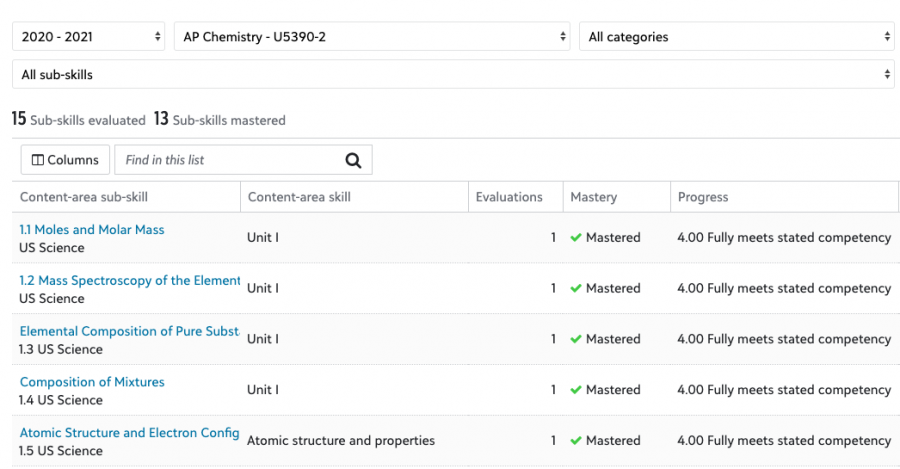AP Biology and AP Chemistry Switch to Standards-Based Grading for 2020-2021 School Year
The new standards-based grading system in AP Chemistry is incorporated within the MyGreenhill platform.
December 8, 2020
Two historically rigorous science courses at Greenhill, Advanced Placement (AP) Biology and AP Chemistry, have switched to standards-based grading for the 2020-2021 school year.
In previous years, both classes used a traditional grading structure based on percentages. However, due to the novel COVID-19 pandemic as well as Greenhill’s evolving grading policies, AP Biology and AP Chemistry teachers found the standards-based grading system to be more beneficial to the development and learning of their students.
“A key aspect of the system is growth progress,” said Upper School science teacher Kaleb Mathieu. “Once you take a checkpoint or get a score, you’re able to go back and practice it more, and then reassess on that to show that you’ve grown, which is more consistent with how learning happens. You usually don’t learn something on the first try.”
While AP Biology and AP Chemistry are using standards-based grading, each class’s implementation of the model is quite different.
AP Chemistry uses a one through four scale to assess a student’s level of mastery in various skills, or competencies, in each assessment. In this setup, a one signifies that an individual is beginning to approach the stated competency while a four means that the individual has fully met the stated competency.
“With the scale, I know exactly which skills I have mastered and which skills I need to practice more and reassess on when I log into MyGreenhill,” said senior Jung Min Yean.
In addition, the AP Chemistry grading framework allows reassessments on certain competencies. However, the structure also utilizes a 75 percent decaying average policy. This means that each new score is given a higher weight than the previous scores’ weighted average.
The decision to use decaying average[s] assumes students’ abilities will increase with practice, and errors will decrease with sufficient instruction and support. The calculation focuses on representing the growth occurring, which lends a good balance to proficiency and growth in grading, according to Mathieu.
AP Biology uses a zero, 75 and 100 scale to assess student’s mastery of concepts on assessments ranging from daily assignments to tests. Reassessments are available for all assignments other than tests, according to senior Kaylee Chien.
AP Biology and AP Chemistry students have generally felt positive about the changes to the course. Students appreciate how the standards-based grading system focuses on overall improvement, unlike a traditional grading system.
“I really like the AP Bio standards-based grading system,” said Chien. “This format gives me more motivation to reflect on my work and improve on my work over the course of the year instead of punishing me for a concept I don’t really understand at the moment.”
Yean agrees.
“I definitely like the standards-based grading system over traditional grading because it encourages me to practice skills that I am not comfortable with until I master them rather than focusing on simply getting good grades,” said Yean.
While the COVID-19 pandemic was a catalyst for invoking the standards-based grading system into these courses, it was not the sole cause. Students and teachers agree that standards-based grading is the future of the science department.
“The pandemic helped make the jump, but I had been planning this transition for a while now,” said Mathieu. “The system puts social-emotional well-being first, which, in my view, helps so many of the stressors that this year has brought.”
Chien agrees.
“Now that I think about it, standards-based grading is going to be the future of the science department,” said Chien. “It will take some planning on how they are going to implement it into more classes that are different from AP Biology or Chemistry, but the emphasis on improvement is so important.”
Standards-based grading goes beyond the science department at Greenhill. Many believe that will be the future of education overall.
“[Standards-based grading] will be the future of grading in general,” said Mathieu. “By purposefully assigning meaning to grades through standards, it’s going to be more beneficial to help students know what they need to do to grow. And there’s also that growth mindset factor, which promotes the fact that if you don’t see it the first time, you can try and learn again. So, in actuality, it actually is preparing students more for the real world.”











